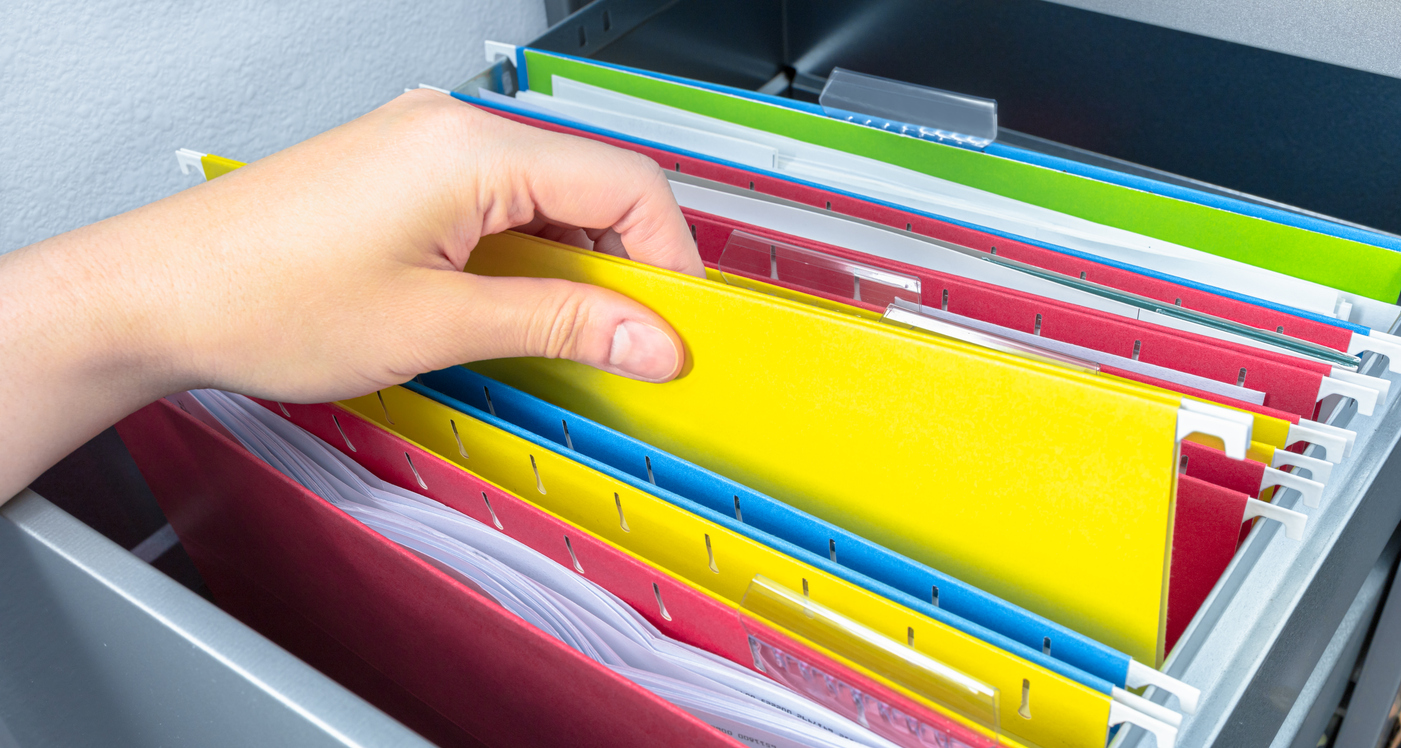
Organizing important documents for seniors becomes increasingly important as your loved ones’ age. Proper organization ensures that essential information is accessible when needed, providing peace of mind for seniors and their caregivers. This article will discuss the types of files to include and how to organize them effectively. We will also explore how to manage documents in special situations, including managing Alzheimer’s, handling emergencies and navigating the complexities of relocating.
Documents to Include

When organizing important papers for a senior, gathering a comprehensive collection of critical documents is vital. You can categorize these into medical, legal, financial and personal records.
Medical Records
An essential component of the recordkeeping for seniors is medical records. These consist of a thorough medical history that covers previous surgeries, long-term illnesses, allergies, and prescription drugs.
- Having a list of your current prescriptions and dosages is important. This is helpful for medical emergencies and regular check-ups.
- Keeping this information up-to-date is crucial. It ensures that healthcare providers have accurate information about your medications.
- Another thing to consider is insurance information, including Medicare paperwork, long term care policies and health insurance coverage. These guarantee prompt access to any required medical services.
In addition, it’s important to keep an extensive list of healthcare professionals along with their contact information. This includes all medical professionals who treat the loved one, such as primary care physicians, specialists, and dentists. Having instructions like DNR orders and healthcare power of attorney in advance is important. These are essential to ensure that we honor and carry out an elderly loved one’s medical expectations.
Legal Documents
In the process of organization, legal paperwork is equally important. At the core of this category are wills and trusts.
- Include copies of the living trust, last will and any other testamentary records. These outline the distribution of assets and ensure that loved ones honor the last wishes.
- Power of attorney is also essential, as it designates an individual to act on behalf of the senior. Everyone should appoint a power of attorney for finances and healthcare.
- Next, consider including property deeds and titles to real estate and vehicles. These records serve as proof of ownership and are useful for maintaining and transferring property.
- Having documents like birth and marriage certificates is important. These documents help prove identity and marital status. Legal and financial matters require them.
Financial Records
Financial records are another critical category when organizing important documents for a senior loved one. This includes bank statements that provide information about all bank accounts, including savings and checking. It also includes investment account documentation, such as stocks, bonds and retirement accounts. These records assist in managing financial assets and ensuring their appropriate handling.
Saving tax returns from recent years is important. We recommend the past five years. This will help with financial planning and handling any tax-related problems that come up. Tracking debts such as mortgages, loans, and credit card statements helps you manage financial obligations better.
Personal Records
Personal records are just as essential to consider when organizing important documents for seniors. Identification cards, which include social security cards, driver’s licenses and passports fall under this category.
These are necessary to validate, identify and gain access to different services. If applicable, retain copies of military records. Veterans may need them for benefits and other services.
An extensive list of contacts, including family, friends and other significant people, is also helpful. This guarantees prompt communication with the appropriate parties if an emergency or other circumstance occurs.
How to Organize Important Documents for Seniors

Effectively organizing important documents for a senior involves categorization, labeling and systematic filing. Start by sorting files into categories as mentioned above: medical, legal, financial and personal. This helps you easily locate specific information when required.
Clearly label each document or folder with its content. Use color-coded labels or tabs to differentiate between categories at a glance.
Invest in a filing cabinet or a sturdy box with multiple folders. Arrange the folders in a logical order, alphabetically or by category.
Store the Documents Properly

Properly storing any physical documents protects them from damage. For physical copies, store file folders and personal information in a fireproof and waterproof safe. Ensure you place the safe in a location that is both secure and accessible. Storing important documents in a bank safety deposit box is a good idea.
Storing files digitally is also safe and convenient. Simply create organized folders on a computer or cloud storage or your healthcare provider’s patient portal. Digital files have the advantage of being accessible from anywhere. This arrangement ensures that you can easily access documents when you need them most and without much hassle.
Special Situations

Certain scenarios necessitate heightened attention to the organization and storage of documents. This involves getting ready for unexpected health problems. It also involves managing the responsibilities of a family member with memory issues such as Alzheimer’s. Additionally, it involves coping with the challenges of relocating to a new area.
Health Emergencies
Keeping your papers organized saves precious time. This can make all the difference in an emergency. For example, if a professional caregiver needs to call an ambulance or contact a medical professional.
Keep a copy of all essential documents, like medical and health records and identification, in an accessible place. Include a list of all health care providers, doctors and prescriptions.
Also include health information on pre-existing medical conditions, recent test results, medical devices or allergies. Consider a portable file organizer for easy transport. This preparation will help you to better inform medical providers who are assisting with emergency care. Also, it will give you peace of mind and readiness for any situation.
Alzheimer’s Disease
A diagnosis of dementia makes it even more essential that family caregivers spend time organizing important documents for seniors. People with Alzheimer’s should have their medical information, power of attorney and advance directives readily available to ensure professionals understand their needs and goals when care is necessary. Their limited cognitive capacity makes it difficult for them to express thoughts or share essential information. Having the appropriate documents with them ensures their wishes are respected.
Medical records and health information can provide important information about their health history and any acute or chronic conditions. Power of attorney allows someone to make decisions on their behalf. Advance directives outline their wishes for medical care in the future. Having these documents easily accessible can make managing their care easier for both the individual and their caregivers.
Keep a copy of these documents with their primary caregiver and another set in a secure location. This ensures that in case of any medical emergencies or other situations, the necessary information is easily accessible.
Document Organization and a Move
Seniors often move to simplify their lifestyle, be closer to family or get the care they need in assisted living. While necessary, this transition period can emotionally charge and challenge older adults and their families.
A careful and considerate approach to senior document organization is key to facilitating a smoother transition. Create a file with the latest contact information for local moving professionals. This will help you quickly and efficiently address any logistical issues that may arise. Keep handy important housing paperwork, such as the most recent lease agreements or mortgage paperwork.
Planning the move schedule and giving attention to senior document organization can help reduce stress. It can also provide stability for your loved one during this major life change.
Conclusion
Organizing important documents for seniors is important. This will ensure their well-being and give caregivers peace of mind.
- Gather all required documents.
- Arrange them in a logical order.
- Keep them in a safe place for quick and easy retrieval.
- Give careful consideration to special circumstances.
Proper organization simplifies access to critical documents and prepares you for unforeseen circumstances, ultimately safeguarding your loved one’s interests.
For more assistance with caring for a senior loved one at home, contact Salus, your five-star, accredited home care provider in Orange County.

